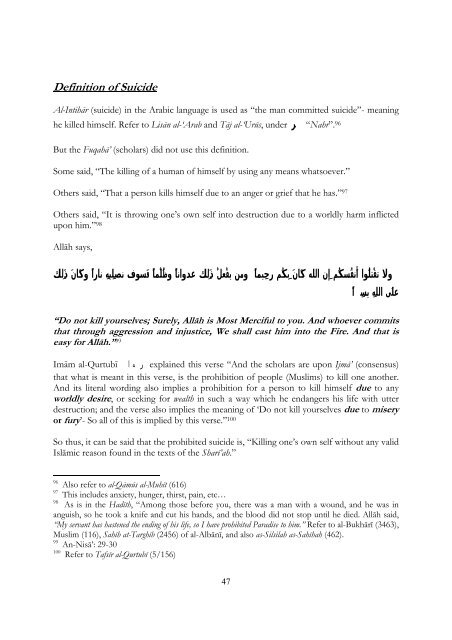the-islamic-ruling-on-the-permissibility-of-self-sacrificial-operations-suicide-or-martyrdom
the-islamic-ruling-on-the-permissibility-of-self-sacrificial-operations-suicide-or-martyrdom
the-islamic-ruling-on-the-permissibility-of-self-sacrificial-operations-suicide-or-martyrdom
You also want an ePaper? Increase the reach of your titles
YUMPU automatically turns print PDFs into web optimized ePapers that Google loves.
Definiti<strong>on</strong> <strong>of</strong> Suicide<br />
Al-Intihār (<strong>suicide</strong>) in <str<strong>on</strong>g>the</str<strong>on</strong>g> Arabic language is used as “<str<strong>on</strong>g>the</str<strong>on</strong>g> man committed <strong>suicide</strong>”- meaning<br />
he killed him<strong>self</strong>. Refer to Lisān al-‘Arab and Tāj al-‘Urūs, under نحر “Nahr”. 96<br />
But <str<strong>on</strong>g>the</str<strong>on</strong>g> Fuqahā’ (scholars) did not use this definiti<strong>on</strong>.<br />
Some said, “The killing <strong>of</strong> a human <strong>of</strong> him<strong>self</strong> by using any means whatsoever.”<br />
O<str<strong>on</strong>g>the</str<strong>on</strong>g>rs said, “That a pers<strong>on</strong> kills him<strong>self</strong> due to an anger <strong>or</strong> grief that he has.” 97<br />
O<str<strong>on</strong>g>the</str<strong>on</strong>g>rs said, “It is throwing <strong>on</strong>e’s own <strong>self</strong> into destructi<strong>on</strong> due to a w<strong>or</strong>ldly harm inflicted<br />
up<strong>on</strong> him.” 98<br />
Allāh says,<br />
﴿ولا تق ْتل ُوا أ َنف ُسك ُم إِن َّ الل َّه ك َان َ بِك ُم رحِيما ً ومن يف ْعل ْ ذ َلِك عدوانا ً وظ ُل ْما ً ف َسوف نصلِيهِ نارا ً وك َان َ ذ َلِك<br />
عل َى الل َّهِ يسِيرا ً﴾<br />
“Do not kill yourselves; Surely, Allāh is Most Merciful to you. And whoever commits<br />
that through aggressi<strong>on</strong> and injustice, We shall cast him into <str<strong>on</strong>g>the</str<strong>on</strong>g> Fire. And that is<br />
easy f<strong>or</strong> Allāh.” 99<br />
Imām al-Qurtubī رحمه االله explained this verse “And <str<strong>on</strong>g>the</str<strong>on</strong>g> scholars are up<strong>on</strong> Ijmā’ (c<strong>on</strong>sensus)<br />
that what is meant in this verse, is <str<strong>on</strong>g>the</str<strong>on</strong>g> prohibiti<strong>on</strong> <strong>of</strong> people (Muslims) to kill <strong>on</strong>e ano<str<strong>on</strong>g>the</str<strong>on</strong>g>r.<br />
And its literal w<strong>or</strong>ding also implies a prohibiti<strong>on</strong> f<strong>or</strong> a pers<strong>on</strong> to kill him<strong>self</strong> due to any<br />
w<strong>or</strong>ldly desire, <strong>or</strong> seeking f<strong>or</strong> wealth in such a way which he endangers his life with utter<br />
destructi<strong>on</strong>; and <str<strong>on</strong>g>the</str<strong>on</strong>g> verse also implies <str<strong>on</strong>g>the</str<strong>on</strong>g> meaning <strong>of</strong> ‘Do not kill yourselves due to misery<br />
<strong>or</strong> fury’- So all <strong>of</strong> this is implied by this verse.” 100<br />
So thus, it can be said that <str<strong>on</strong>g>the</str<strong>on</strong>g> prohibited <strong>suicide</strong> is, “Killing <strong>on</strong>e’s own <strong>self</strong> without any valid<br />
Islāmic reas<strong>on</strong> found in <str<strong>on</strong>g>the</str<strong>on</strong>g> texts <strong>of</strong> <str<strong>on</strong>g>the</str<strong>on</strong>g> Sharī’ah.”<br />
96 Also refer to al-Qāmūs al-Muhīt (616)<br />
97 This includes anxiety, hunger, thirst, pain, etc…<br />
98<br />
As is in <str<strong>on</strong>g>the</str<strong>on</strong>g> Hadīth, “Am<strong>on</strong>g those bef<strong>or</strong>e you, <str<strong>on</strong>g>the</str<strong>on</strong>g>re was a man with a wound, and he was in<br />
anguish, so he took a knife and cut his hands, and <str<strong>on</strong>g>the</str<strong>on</strong>g> blood did not stop until he died. Allāh said,<br />
“My servant has hastened <str<strong>on</strong>g>the</str<strong>on</strong>g> ending <strong>of</strong> his life, so I have prohibited Paradise to him.” Refer to al-Bukhārī (3463),<br />
Muslim (116), Sahīh at-Targhīb (2456) <strong>of</strong> al-Albānī, and also as-Silsilah as-Sahīhah (462).<br />
99 An-Nisā’: 29-30<br />
100<br />
Refer to Tafsīr al-Qurtubī (5/156)<br />
47


